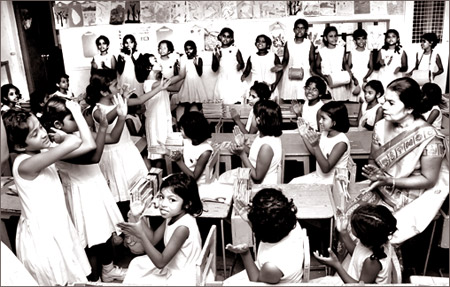Ten Year National Plan - milestone towards a Trilingual Sri Lanka
S Anthonithasan Croos
A Ten Year National Plan for a Trilingual Sri Lanka will be launched
by President Mahinda Rajapaksa on January 21, 2012. This is yet another
strong initiative of the President to create long lasting peace and
harmony among all Sri Lankan communities, through a steady and
far-sighted language policy.
 |
|
Teaching
English the Sri Lankan way |
This initiative should be viewed as a gradual evolution and a major
stride from the President's declaration of the year 2009 as the Year of
ICT and English. Also, it shows the smooth and systematic approach of
the Presidential Task Force in implementing the ideology of President of
Sri Lanka Mahinda Rajapaksa for a Trilingual Sri Lanka.
There is certain logic behind the two initiatives of the President.
To make Sri Lanka trilingual, first the two major linguistically divided
communities - the Sinhalese and Tamils - are to be brought closer
together in social interactions and communication. To do this, the
language barrier between these two communities has to be broken. There
were voices from different quarters that Sinhala language should be
taught to Tamils and vice versa.
English as common property
The President wisely declared 2009 as the Year of English along with
ICT stressing the need for all Sri Lankans to learn English for national
integration, development and prosperity. Thus the President made English
a common property to be owned by all Sri Lankans.
To this end, the Presidential Task Force on English and IT, getting
the expertise from Sri Lankan scholars and professionals introduced and
implemented some innovative teaching approaches like ‘English as a Life
Skill’, to teach English in all Sri Lankan schools, making English
assume its own ideological identity defined in terms of Sri Lankan
English.
This new ideology stresses the need for learning English for its
utility value and not for its social worth. This has given encouragement
to the vast majority of the general Sri Lankan populace to speak English
the Sri Lankan way. In addition, several strategy plans were put in
practice by the PTE to train teachers to teach English using new
methodologies.
The Special Initiatives Unit (SIU) and the Presidential Programme
Unit (PPU) also joined hands with the PTE in this national endeavour. An
innovative programme called ‘English in 100 Hours’ for adults was
designed and implemented by the SIU and PPU to help thousands of youth
and government officers acquire basic essential skills in English to
find employment and work efficiently in government departments.
Against this backdrop of English being made the common property of
all Sri Lankans, the President's second initiative to teach Sinhala to
Tamils and vice versa for a Trilingual Sri Lankan should be welcome and
appreciated by all.
This is because the President's prudent move in this regard has
created a situation now, where people would naturally be motivated by
themselves to learn the mother tongue of their compatriots and brethren
with the real interest of gaining an insight into each other's culture,
tradition and behavioural patterns learning to lead a peaceful
coexistence.
There is no doubt that at the initial stages of implementing the
trilingual progrmames, English has to play a pivotal role as a link
language to bring all Sri Lankans closer and make them work for common
goals as Sri Lankans, and the stage for that has already been set.
Special Initiatives Unit
Although implementing the Ten Year National Plan for a Trilingual Sri
Lanka seems to be a mammoth task, the Presidential Task Force on English
has already laid the groundwork for this historically important event
and is well set to carry out this plan in the national interest by
closely collaborating and coordinating matters with the officials at the
Special Initiatives Unit and the English Language Unit of the Education
Ministry.
In spite of the efforts and commitment of the PTF and other state
institutions to the Presidential Initiative, they cannot achieve the
goal of making a Trilingual Sri Lanka easily without the genuine
commitment of all Sri Lankans. So it becomes of paramount importance for
us to understand the rationale behind the Presidential Initiative for a
Trilingual Sri Lanka.
There is no reason to believe that the initiative is taken as a
political ploy. Rather, we should have a neutral view and make impartial
judgments on the initiative beyond all our political affiliations, if
the initiatives are meant for the common good of all Sri Lankans.
Therefore, let us all become part of this national undertaking, and
make others realize the need for a Trilingual Sri Lanka, thus helping
the PTF implement its programmes as envisaged.
The writer is attached to Provincial English Support Centre, Mannar
|



